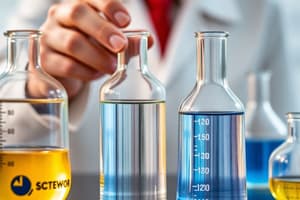Podcast
Questions and Answers
What is an experiment primarily designed to do?
What is an experiment primarily designed to do?
- Provide subjective conclusions about a variable
- Determine the aesthetic qualities of an observation
- Confirm existing scientific facts without questioning
- Test a hypothesis through observation and evidence (correct)
Which of the following best describes a scientific fact?
Which of the following best describes a scientific fact?
- A statement that can never be proven true or false
- An opinion held by a majority in the scientific community
- An undeniably true statement that can be proven through observations (correct)
- A claim that is always accepted without evidence
In the experiment regarding alligator egg incubation, what is the independent variable?
In the experiment regarding alligator egg incubation, what is the independent variable?
- The temperature of egg incubation (correct)
- The type of alligator egg used
- The sex of the alligator
- The duration of the incubation period
What distinguishes a scientific law from a scientific theory?
What distinguishes a scientific law from a scientific theory?
Why is empirical testing essential in science?
Why is empirical testing essential in science?
What are the dependent variables in an experiment focused on egg incubation temperature?
What are the dependent variables in an experiment focused on egg incubation temperature?
Which statement reflects the nature of scientific facts?
Which statement reflects the nature of scientific facts?
Which aspect is crucial for a controlled experiment to be effective?
Which aspect is crucial for a controlled experiment to be effective?
In the hypothesis regarding alligator egg incubation, which variable is dependent?
In the hypothesis regarding alligator egg incubation, which variable is dependent?
What is the primary difference between an observation and an experiment?
What is the primary difference between an observation and an experiment?
Which option best describes a characteristic of controlled experiments?
Which option best describes a characteristic of controlled experiments?
What was a significant contribution of William Harvey to the field of scientific experimentation?
What was a significant contribution of William Harvey to the field of scientific experimentation?
What is the main role of controlled experiments in scientific research?
What is the main role of controlled experiments in scientific research?
Which of the following best describes empirical testing?
Which of the following best describes empirical testing?
Which statement accurately distinguishes scientific theories from laws?
Which statement accurately distinguishes scientific theories from laws?
In field experiments, which statement about their environment is accurate?
In field experiments, which statement about their environment is accurate?
Which characteristic of a good scientific theory indicates that it can change in response to new data?
Which characteristic of a good scientific theory indicates that it can change in response to new data?
What is a key distinction between scientific theories and scientific laws?
What is a key distinction between scientific theories and scientific laws?
Newton's theory of universal gravitation states that gravity is dependent on which two factors?
Newton's theory of universal gravitation states that gravity is dependent on which two factors?
What characteristic of a scientific theory allows it to achieve more than previous theories?
What characteristic of a scientific theory allows it to achieve more than previous theories?
Why is empirical testing important for scientific theories?
Why is empirical testing important for scientific theories?
In what way can scientific laws often be described?
In what way can scientific laws often be described?
What does it mean for a scientific theory to be falsifiable?
What does it mean for a scientific theory to be falsifiable?
What role do controlled, repeated experiments play in scientific theories?
What role do controlled, repeated experiments play in scientific theories?
Flashcards are hidden until you start studying
Study Notes
Quantitative Observations
- Can be objectively compared in experiments.
- They measure a specific attribute like the length of road, providing concrete data.
Facts
- Statements that can be proven through substantial evidence.
- Can be true or false but their validity can be established.
Scientific Facts
- Undeniably true statements accepted by the scientific community.
- Proven through observations and testing.
- Can only be confidently asserted for relatively simple statements.
- Can be modified or discarded with new evidence.
Experiments
- Tests designed to provide evidence for answering questions or testing hypotheses.
- Follow organized steps within the scientific method.
- Contain two key variables: independent and dependent.
Independent Variable
- The factor manipulated by the experimenter in an experiment.
- Example: temperature at which alligator eggs are incubated.
Dependent Variable
- The factor measured or observed in an experiment, influenced by the independent variable.
- Example: sex of the alligator hatched.
Control Variable
- A factor kept constant in an experiment to ensure that only the independent variable affects the dependent variable.
- Example: variety of marijuana used in an experiment testing fertilizer's effect on CBD oil quality.
Observation vs Experiment
- Observation: Gathering information using senses or measurements.
- Experiment: Actively imposing a treatment to measure a response.
Types of Experiments
- Controlled Experiment: Conducted in a laboratory or controlled environment.
- Field Experiment: Conducted in a natural environment.
William Harvey's Experiments
- Used to challenge existing knowledge about blood circulation.
- Supported the idea of blood flow.
- Established a cause-and-effect relationship.
- Led to the prediction of capillaries.
Scientific Theory
- A well-substantiated explanation of a natural phenomenon.
- Based on the scientific method and repeated testing.
- Empirically testable and falsifiable.
- Useful for describing and explaining observed phenomena.
- Correctable and dynamic, evolving with new data.
Scientific Law
- An empirical statement of a universally true phenomenon.
- Can be explained mathematically.
- Can be used to make predictions.
- Describes observed phenomena.
Newton's Theory of Universal Gravitation
- Explains gravity as a predictable force acting on all matter.
- Affected by mass and distance.
Importance of Hypothesis
- Both scientific theories and laws are based on hypotheses.
- Hypotheses are educated guesses that are tested through experiments.
Studying That Suits You
Use AI to generate personalized quizzes and flashcards to suit your learning preferences.




